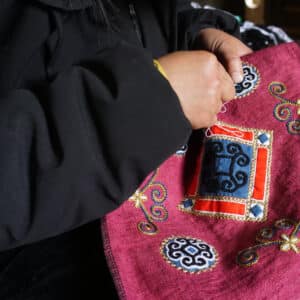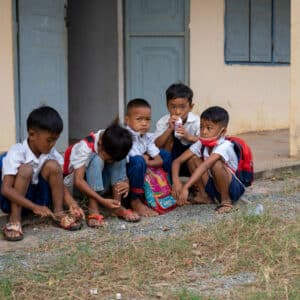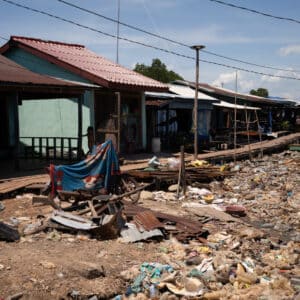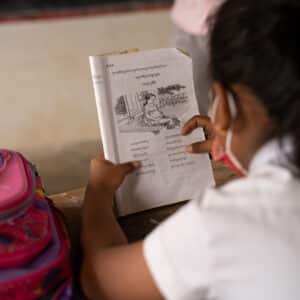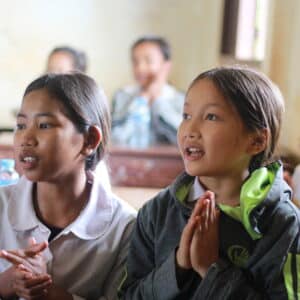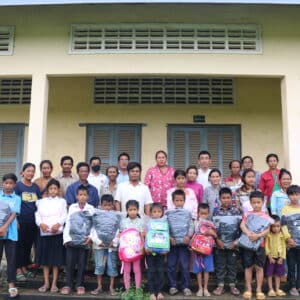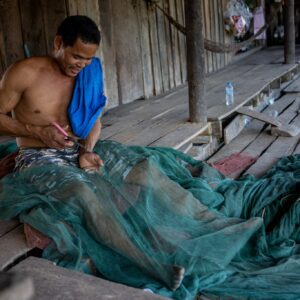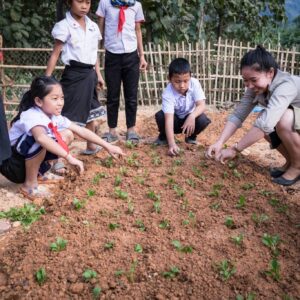In Cambodia’s rural Siem Reap province, teacher Chea Seiha reveals that the local community used to be afraid of children with disabilities. Even Seiha herself admits that before she started teaching, she didn’t understand much about the various needs of children with disabilities, largely because they were excluded from education and society.
“The community used to feel that education was not for children with disabilities but when Rabbit School Organisation opened their education program and the community saw these children learn and improve, they changed their minds”, explains Seiha who received training from local nonprofit Rabbit School Organisation to be a teacher for children with disabilities five years ago.

Barriers to education
Before the pandemic, research from The Cambodian Disabled People’s Organisation (CDPO) found that out of 4,000 persons with disabilities interviewed in Cambodia, over 60 per cent were living under the poverty line and more than 60 per cent of children with disabilities were unable to attend school.
Determined not to let the global crisis of COVID-19 deepen pre-existing inequalities, Aide et Action is leading The Cambodian Consortium for Out of School Children in partnership with Educate A Child, a global programme of Education Above All Foundation to ensure all children have access to primary school education. Alongside fellow consortium member Rabbit School Organisation, we are training teachers like Seiha to identify children with disabilities who are not in school and to get them enrolled in education.
The Disability Development Services Program
The Disability Development Services Program is also playing a key role in supporting the Consortium’s efforts and as primary schools reopened in November 2021, after more than 300 days of closures since March 2020, launched a community campaign to promote the return to the classroom. In collaboration with school directors and local authorities in Pursat province, in Cambodia’s west, the campaign gathered the support of 400 participants from mixed backgrounds such as school teachers, village chiefs, commune council members and students to travel through villages with banners and loudspeakers encouraging all children to go to school.

To identify students at risk of never receiving an education, the Disability Development Services Program also conducted a workshop on school mapping on 24 November 2021. The workshop which included the participation of the Provincial office of Education, Department of Education, school directors, teachers, school support committees, village chiefs and commune council members from 15 schools resulted in identifying 51 students, of whom almost 10% were children with disabilities. Currently, to support these students, The Consortium is offering counselling support to parents and in-kind support such as school uniforms, learning materials, bicycles and more.
Although the Covid-19 pandemic has presented numerous challenges to students with disabilities by restricting access to classroom-based education and peer-to-peer socialization as well as impacting livelihoods, teachers have implemented flexible learning strategies to continue education for the most marginalized.
Rabbit School Organisation
In Kampong Speu province, teachers Horm Chandy and Phun Kanha who received training from Rabbit School Organsiation spent the best part of a year and a half using the school facilities to photocopy lessons for their students to complete at home. This, combined with video calls with students and their parents, were the best means available to keep students engaged in learning. Some parents came to the school to pick up lesson worksheets and drop off completed ones and for those that couldn’t, the pair tried to go house-to-house to follow up with students in person.
“Parents, while they may be trying their best and staying at home, they don’t know how to take care of the children’s education and development in the same way their teachers do in a classroom environment”, explained Chandy. To better support parents teachers like Chandy demonstrated online how to teach the children to parents and how to make simple educational toys and games.

While classrooms remained closed, The Consortium has been busy upgrading infrastructure such as water, sanitation and hygiene facilities, classrooms and play areas for children in schools to ensure when children return to school they’ll be in a safe learning environment suited to their needs.

Partnerships for inclusion
With only eight years left to meet the UN Sustainable Development Goal 4 of Quality Education which includes eliminating disparities in education and ensuring “equal access to all levels of education and vocational training for the vulnerable, including persons with disabilities”, Vong Vuthy, Programme Manager of Rabbit School Organisation, says partnerships like The Cambodian Consortium for Out of School Children are critical.
“To achieve universal primary education [for all], we really need to work as team,” says Vuthy. “More than that, teamwork will also contribute to quality education and human resources through sharing and supporting financial resources, institutional system development, working approaches or technic and capacity building”.
Currently, Rabbit School Organisation is participating in a working group led by the Ministry of Education, Youth and Sport and international nonprofit Save the Children to develop the National Manual on Teaching Children with Intellectual Disabilities, Learning Disabilities and Autism Spectrum Disorder to support teachers in creating integrated and inclusive classrooms.
Cambodia’s new academic year will start in January 2022 and as we mark International Day of Persons with Disabilities on 3 December 2021, we wish to highlight our commitment to inclusive education that leaves no child behind.




